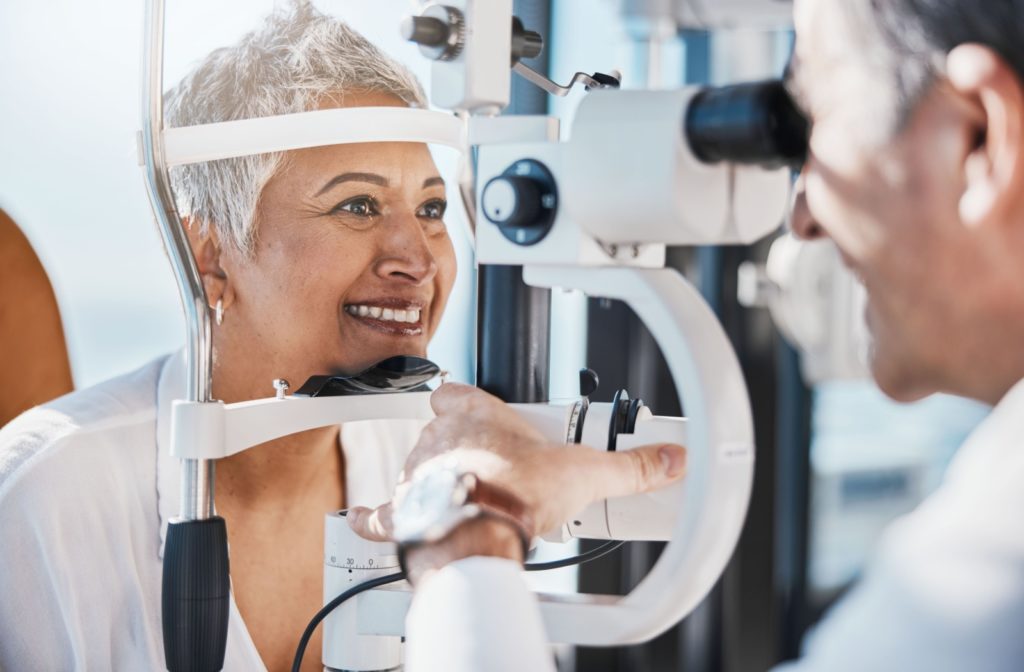If you’ve ever dealt with headaches, double vision, and dizziness, you may have been experiencing a problem called binocular vision dysfunction. This common eye condition can be frustrating and difficult to treat without the help of an experienced optometrist. So, what causes binocular vision dysfunction—and what can you do about it?
Binocular vision dysfunction develops due to an imbalance in the muscles controlling your eye’s movements. This leaves your eyes unable to properly focus and work together, making it significantly more difficult to focus on objects and keep your vision clear. Fortunately, you can visit your optometrist to discuss vision therapy as a solution.
What Is Binocular Vision?
The human eye is incredible. Your two eyes see the world at slightly different angles, and your brain can combine these images to create a singular 3D picture of your environment. To work properly together, your eyes need to coordinate efficiently and effectively, using skills you naturally build over the course of your life.
To do so, they are controlled by a complex network of muscles, which work in harmony to allow your eyes to move and focus on objects. When this system works, you can seamlessly see everything around you. This visual ability is called “binocular vision.”
However, what if there’s a problem with how the eyes coordinate? These muscles don’t always work perfectly. Exhaustion, brain injuries, and developmental issues can all affect binocular vision. When you struggle to coordinate properly, it’s called “binocular vision dysfunction.”
What Can Cause Binocular Vision Dysfunction?
Several problems can set off binocular vision dysfunction. At the top of the list are traumatic brain injuries, or TBIs.
Concussions are an extremely common cause of binocular vision dysfunction. When you have a concussion, your brain is impacted, and this can put additional strain on the visual system. This often causes double vision, blurriness, and difficulty focusing your eyes.
Other common causes of binocular vision dysfunction can include:
- Weakness in the eye muscles
- Irregularities in the physical structure of your face
- Neurological conditions like multiple sclerosis and strokes
- Age-related changes in the eyes and brain
The Signs of Binocular Vision Dysfunction
So, how do you recognize the signs of binocular vision dysfunction? Knowing what to look out for is key to addressing the problem. Try to keep an eye out for the following signs:
- Headaches
- Double vision
- Blurred vision
- Dizziness or motion sickness
- Difficulty reading or concentrating
- Neck pain or facial discomfort
- Needing to use a guide when reading, like a finger or a pen
These can all be indications that something is wrong with your visual system and that you should visit an optometrist.

How to Treat Binocular Vision Dysfunction
Binocular vision dysfunction can be frustrating, uncomfortable, and inconvenient. However, the good news is that it’s also highly treatable. It all starts with a comprehensive eye exam.
Eye exams are about more than clear vision and new glasses. They give an optometrist the chance to examine all the different structures of your eyes. Your optometrist can assess:
- How your eyes align
- How well your eyes can move and track objects
- How efficiently your eyes work together to focus on objects
- If there are any physical or neurological issues impacting your vision
Once the optometrist has assessed your visual system, they can create a personalized treatment plan. This plan will likely incorporate vision therapy.
What Is Vision Therapy?
Vision therapy is a non-invasive and highly effective approach to re-training your visual system. This treatment involves personalized exercises and activities designed to help your eyes work together better.
Through vision therapy, you can learn to improve and strengthen your:
- Eye coordination
- Ability to follow moving objects smoothly and accurately
- Depth perception
- Visual processing speed and accuracy, enabling you to process and react to the information your eyes see quickly
Tackling binocular vision is crucial for keeping your visual system strong. By working closely with an optometrist, you’ll be able to teach your brain and eyes to work properly together, which can significantly affect your quality of life.
Get Help for Your Vision
If you’ve recently been experiencing anything unusual with your vision, contact us here at Total Vision Tierrasanta.
We can examine your eyes and help diagnose your condition, then work closely with you to design a custom treatment plan. Don’t deal with vision issues alone; book an appointment with our team today!


